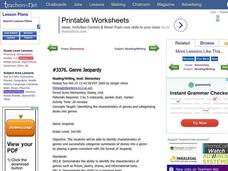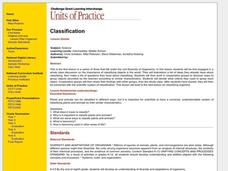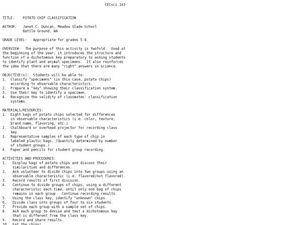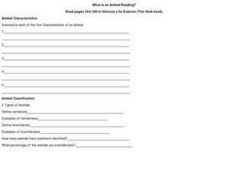Curated OER
Plant Identification Pictionary
Students participate in a plant identification game. Using worksheets, they collect plant samples and identify the basic parts of the plant. They note the similarities and differences between the various diagrams. They use heavy books...
Curated OER
Creature Features
Learners examine why certain animals live in only specific places throughout the world. Using animals, they classify them based on their characteristics and identify their basic needs. They also observe and compare the life cycles of...
Curated OER
Farm Life
Pupils identify features and characteristics of a farm. Students recall events from the book, Tanya's Reunion. Pupils visit a local farm. Students sing the song Old MacDonald had a Farm and Farmer in the Dell while on the way to the...
Curated OER
Utah's Biomes
Fourth graders discover what a biome is and study biomes that are native to Utah in this series of lessons. They examine how Utah's biomes have changed over time due to the influence of the Mormon pioneers and other human populations.
Curated OER
The Queen of Sheba
Students discuss various versions of the myth of The Queen of Sheba and the basic characteristics of myths. They research how different cultures interpret the story and include it in their religious beliefs. They create projects about...
Curated OER
Beginning of the Year Activity Using The Rainbow Fish
Students are read "The Rainbow Fish Big Book". They discuss how each one of them are unique in some way. They decorate their own fish to show their characteristics and shares it with the class so they are able to learn about each other.
Curated OER
Gorillas: The Facts, The Fiction
Students research characteristics of gorillas and complete an included worksheet. They answer inquiry-based questions using a variety of resources.
Curated OER
Genre Jeopardy
Students participate in a game-like format to identify characteristics of genres. They categorize stories into genres bases on story summaries after a class discussion of the characteristics.
Curated OER
Italian Renaissance
Fifth graders explore the Italian Rensissance in this six lessons unit. The prominent citizens, the ideas, values, art, philosophy, and literature of the are seen as a rediscovery of Ancient Greek and Roman times.
Curated OER
Classification
Young scholars investigate how to classify items based on similar characteristics. They study the scientific system of classification.
Curated OER
The Difference Between Comets, Meteors And Asteroids
Students use Venn diagrams to highlight the similarities and differences between comets, meteors, and asteroids.
Curated OER
Wetland Wonders
Students study the characteristics of wetlands, and their importance to humans and wildlife.
Curated OER
What Lives In A Shell?
Second graders study the readily observable characteristics of marine invertebrates, 2nd graders research the invertebrates and complete worksheets in this series of lessons.
Curated OER
Potato Chip Classification
Students classify specimens by observable characteristics. By classifying potato chips, they are introduced to the dichotomous key for identifying plant and animal specimens.
Curated OER
Identifying Clouds
Eighth graders research and present to the class information about cloud categories. They observe clouds and describe the characteristics of their cloud observations. They take a cloud identification quiz.
Curated OER
Chips Ahoy: Chip Off the Old Block
First graders compare and contrast adult and baby animals to identify similar characteristics shared by both.
Curated OER
Soil Analysis Lesson Plan
Learners practice calculating density and examine examples of the physical characteristics of soil. They solve a "crime" based on the evidence and laboratory investigations.
Curated OER
What Makes a Hero? Characteristics of a Hero
Students define the word hero, choose the personality traits they think make someone a hero, and write about the characteristics they think make a person a hero.
Curated OER
Carbon: Structure Matters
Learners explore the molecular structure of matter and how it can affect the physical characteristics of a specific material. They investigate the role carbon plays in the chemistry of life.
Curated OER
What is an Animal Reading?
Students read an article out of their science book. In this vertebrates and invertebrates lesson students complete a worksheet and answer questions after reading.
Curated OER
Characteristics of Life
Students study the characteristics of life and what conditions support it. In this biology lesson students divide into groups and complete a textbook assignment.
Curated OER
Daddy's Big Shoes
Students create something for their fathers. In this daddy's big shoes instructional activity, students trace their dad's shoe to create a template. Students fill the shoe with reasons why they think dad is special.
Curated OER
Human Traits
Students study vocabulary and complete a survey. In this human traits lesson students collect and analyze data then discuss what they learned.
Curated OER
The Living Environment
Ninth graders compare and contrast animals according to their four systems. In this living environment lesson plan students complete their assignment on the animal they were given and present their findings to the class.

























